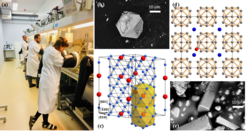Solid-state synthesis of correlated electron materials
For any solid-state material, synthesis of clean and defect-free samples is the first step towards comprehensive understanding of its physical properties. Frequently, this crucial step is complicated or even made nearly impossible by elemental immiscibility, high melting temperatures or vapor pressures of constituent elements, or other experimental constraints. The resultant poor sample quality often leads to an erroneous analysis of physical properties, stalling our scientific progress. We have recently showed [1 - 3], that in many cases the defects and imperfections are not that easy to observe. The invaluable insights are only possible using an arsenal of modern-day tools: high-resolution transmission electron microscopy, single-, powder, and synchrotron diffraction experiments, comprehensive microstructure analysis, and high-precision physical property measurements.
This project will use unconventional experimental techniques such as high-pressure (12 GPa) and high-temperature (2500°C) synthesis, spark-plasma sintering, as well as micro-scale structuring, in order to prepare single-phase, defect-free samples of several strongly correlated systems. This will give an invaluable opportunity to study intrinsic properties of old and new materials [4].
Most of the work will be done in-house, with several inter- and intra-departmental collaborations. This project is ideally suited for a student with a background in solid-state chemistry or physics, with an emphasis on synthesis. The majority of student’s time will be spent on synthesis, with an opportunity to learn several sample quality as well as physical property characterization techniques.

Figure I: (a) Laboratory facilities. (b) and (e) SEM images of novel materials, grown by our group. (c) and (d) Crystal structures of complex intermetallic compounds, investigated as part of our recent studies.












